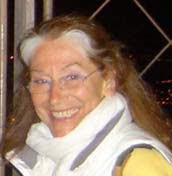 by Madeleine Kando
by Madeleine Kando
From a very early age I was taught that money cannot buy you happiness, In fact, in my family we categorically looked down on money and the pursuit of it. We were ‘artistes’ with a disdain for anything that reeked of materialism.
In hindsight, I realize that much of this indoctrination was an attempt to justify our extreme poverty. Even with this view of the world under my belt, I still felt ashamed of my salvation army issued shoes held together with staples. The wooden soles made me walk with a spastic gait, like Forest Gump.
Our low opinion of monetary matters fit our bohemian lifestyle quite well. Our friends called us colorful and free, the opposite of ‘bourgeois’. My twin sister has never betrayed this world view: to this day she is an avid supporter of the ‘less is more’ philosophy of life.
I, on the other hand, had a painful awareness that others always had more and we had less, colorful and free as we were. Children see what’s important: all that matters to them is the pecking order and my wooden-soled shoes did not exactly help me rank very high.
I wasn't too unhappy however. Most of our friends were poor ‘artistes’ and we liked to make fun of the establishment together, feeling very superior. It wasn’t until I moved to the States that I realized that my views were based on an illusion and they burst like soap bubbles in the turbulence of the new ‘dog eat dog’ world that I found myself in.
Even so, it took many decades to undo the brainwashing that I had undergone. But I was a good mother, and a good citizen: I followed the rules, I moved my family from town to town, trying to find a good school, going from renting to buying a house, working hard to keep up with the Joneses.
Yes, America is a lot more honest about the Darwinian struggle for survival. There is a very interesting analogy put forward by Robert Frank, an economist at Cornell University, who says that Darwin, rather than Adam Smith as the real father of economic theory. Darwin’s ‘survival of the fittest’ applies directly to economic principles in a free-market economy.
There is a catch, though: in the animal kingdom, the ‘fittest’ applies to the fittest individual, not the group. Frank, in his article 'The Invisible Hand, Trumped by Darwin?' gives the example of bull elephant seals who grow so big and fat that they are very good at fighting each other, but very bad at escaping predators. Or the elk with antlers that are so large that they can kill another male but get tangled in the forest when they try to run from a pack of wolves. In other words, what is good for an individual is not always good for the group. What is good for one millionaire is not always good for society. The trickle down effect, in this case, works to the detriment of the group.
Growing more fat blubber or growing bigger antlers forces other seals and other elks to do the same, so who is gaining by that? Not only is the individual seal loosing out by having to lug himself around and the elk becoming so top heavy that he looses his balance, but everyone else in the group has now inherited those traits. It’s like everyone standing up in a movie theatre to see better. The movie theatre, as a group, is worse off with this one action, they just get cramps in their legs from standing.
But to get back to my own story: My original attitude towards (too much) money also has to do with the fact that I grew up in Europe. You might disagree with me, but I personally think that Europeans have a better quality of life. Could it be because their governments have made rules that prevents individuals from going overboard in trying to up the ante?
The antlers on the individuals are a lot smaller over there, but since everyone’s antlers are smaller they don’t feel deprived. Their tax code discourages an individual from becoming so rich, from their antlers becoming so big, that everyone else in society benefits. The ‘norm’ is smaller antlers, less work to lug those around, more vacation time, more money for health care and better schools. Yes, all that energy that now goes into creating fat and antlers, could be siphoned off into creating happier seals without orthopedic problems, faster, happier elks who could avoid being devoured by wolves. Instead of spending the wealth of this nation on bigger yachts, bigger mansions and bigger garages to store Oprah’s dollar bills, we could spend it on creating a system of high speed trains and fixing our infrastructure.
So, maybe my mother was right after all, by inculcating in her children the notion that money is relative. I, for one, am all for smaller antlers. Maybe my twin sister has known the secret to fixing our economy all along: less IS more. leave comment here
Youtube
Contact Form
Popular Posts
-
By Madeleine Kando Flying is like signing away your rights as a human being. Not only is your life put on hold, but you never know which sid...
-
by Madeleine Kando We left Boston early Sunday morning, the day before the 2024 Solar Eclipse. We have friends who live close to the Canadia...
-
Tom Kando Some societies are more successful than others. Today, there are successful societies such as Australia, Canada and Scandinavia,...
-
By Tom Kando Only one thing aggravates me more than the mistakes of the electorate - as exemplified by the Democratic loss in Massachusett...
Tom's Publications and Essays
Madeleine's Publications and Essays
interesting links
Publish Your Article!
A valid author name is required. We will create live links to url's that you specify in your post. Please be patient, and allow us some time to read and approve your article.We reserve the right to refuse any articles that are not deemed appropriate for this blog.








